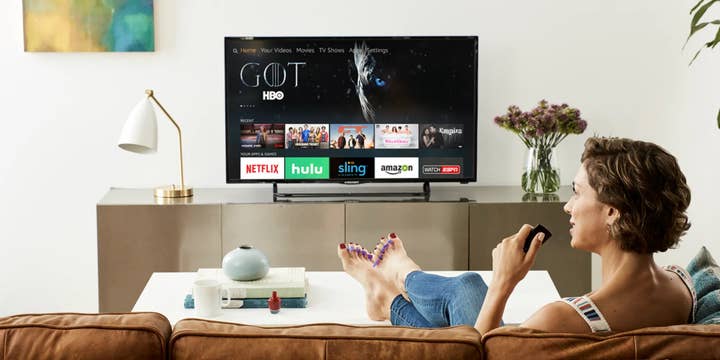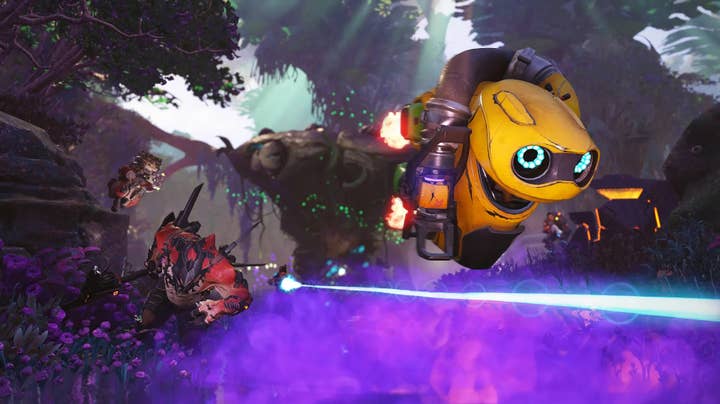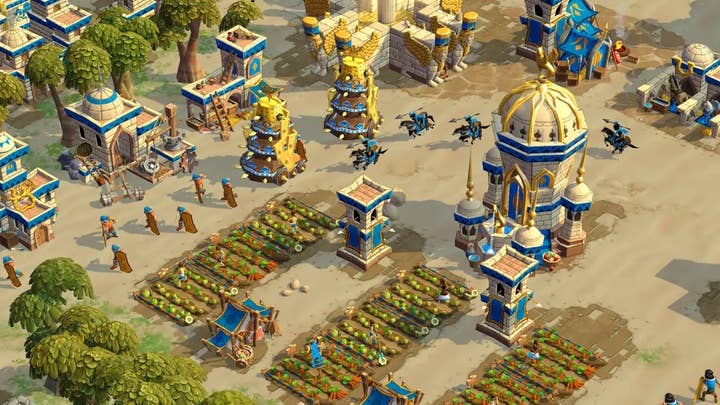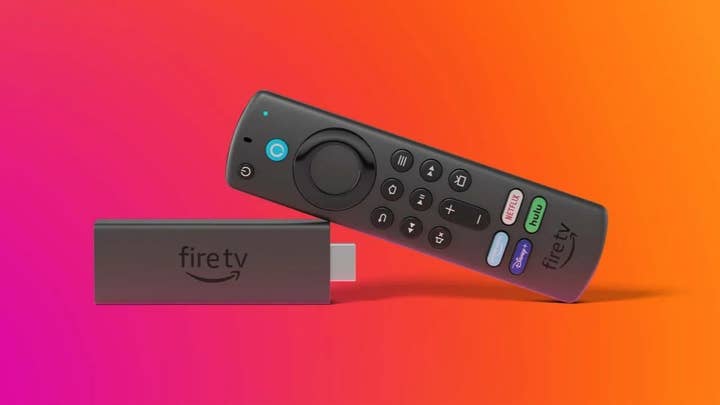Amazon, Google threaten to take over the living room | 10 Years Ago This Month
First details on Fire TV and Android TV fail to impress despite industry's long-simmering anxiety over tech giants' designs on gaming
Sign up for the GI Daily here to get the biggest news straight to your inbox
The games industry moves pretty fast, and there's a tendency for all involved to look constantly to what's next without so much worrying about what came before. That said, even an industry so entrenched in the now can learn from its past. So to refresh our collective memory and perhaps offer some perspective on our field's history, GamesIndustry.biz runs this monthly feature highlighting happenings in gaming from exactly a decade ago.
When Sony and Microsoft successfully broke into the console industry with the PlayStation and the Xbox respectively, it sent a very powerful message to the games industry.
Video games are big business now, and some truly massive international giants are going to spend whatever it takes in order to make your business their business.
So as the 2000s dragged on and tech-savvy companies like Google, Apple, and Amazon grew terrifyingly large, the natural conclusion was that it would only be a matter of time before they turned their eye to video games and ate everybody's lunch, and there was nothing to be done about it. (It's important here that you disregard all knowledge of Panasonic's 3DO, Phillips' CD-I, or Apple's Pippin.)
This had actually been happening for a while before April of 2014. Here's a Digital Foundry editorial about Apple TV and rumors of a gaming system from 2011. Or maybe you'd prefer a 2012 interview with a gaming division of News Corp (another outsider firm attracted by the lure of game revenues) in which the representatives cheerfully hope that Google and Apple-branded TVs destroy the console market. Or the 2013 rumors of new game consoles from Google and Amazon, both of which were following on the microconsole trend kicked off by Ouya, which any gaming historian will tell you was "a freight train plow[ing] into the console games business… forever changing the console games landscape..."
April of 2014 was a big month for this trend though, as Google's plans to launch an Android TV service were leaked, and Amazon made a splash with the unveiling of the $99 Fire TV (which would be supported by exclusive first-party games) as well as the hiring of veteran developers Kim Swift and Clint Hocking.
"You really have to very directly target gamers and Amazon right now is only half-heartedly doing that"David Cole
Industry watchers were by and large unimpressed, with Michael Pachter calling the Fire TV a "non-event" as far as games go, and DFC Intelligence's David Cole saying games appeared to be an afterthought for Amazon in designing the box.
"I think right now it is a rounding error in the game industry but that could change if Amazon decides it wants to make a big investment in the space," Cole said, pointing to the possibility of streaming games. "However, the reality is you really have to very directly target gamers and Amazon right now is only half-heartedly doing that."
That "half-hearted" remark may have been in regards to Amazon's very confusing philosophy of what the company was aiming for in gaming.
"There are studios that have hundreds of people working multiple years on a game – that's not... where we're going," Amazon Games VP Mike Frazzini said in an interview at the time. "That's one end of the spectrum. On the other end of the spectrum you have casual games that are really fun to play, like match-three and puzzles. What we're thinking about is building games that fall more in the middle."

We don't really need a decade's worth of hindsight to notice that "games that fall more in the middle" seems like a poor use of Amazon's strengths, namely the sort of broad and wide-reaching customer base that would benefit casual and free-to-play games, and the sort of massive bankroll necessary to go head-to-head with big players in the AAA space.
The most optimistic analyst about Amazon's chances was IDC research manager Lewis Ward, who said: "Anybody in high tech or in content that sees Amazon jump into their bread and butter market, and isn't concerned about what Amazon might be able to do, should have their head examined.
"Let's put it this way: Fire TV is by far the most viable microconsole platform out there. Couple that with Amazon's back-end streaming, storage, and game-hosting platforms and developer tools, and you've got a serious threat to casual home-based console gaming in particular, at least in North America and pockets of Europe in the next few years."
It was tempting to chalk that up as a Bad Call and move on, but I couldn't bring myself to do it. After all, it's shockingly common for the industry to produce stealth success stories, things that become huge deals for their target audience but are easily missed by those outside of that audience. From Habbo Hotel to World of Tanks to Roblox, there's a long history of games that thrived outside the gaze of the traditional gaming media, even if we eventually came around on them.
So in the interest of giving this microconsole market its due, I reached out to a handful of industry analysts and research firms asking for their numbers about how big the market is for TV-based gaming through devices like the Fire TV, Apple TV, Chromecast devices, and built-in Smart TV functions. The answers didn't give us what we were looking for, but it turns out they were all the answer we needed.
Newzoo told us they just don't have any data on that. Omdia put the worldwide active installed base of Smart TVs and dedicated media streaming devices at nearly 1.48 billion, but cautioned that many aren't actually capable of running games, such services vary by region, and it's difficult on top of that to get an accurate sense of how many people actually use those devices to play games.
Circana told us 96 million US households have such a TV-connected device installed with Roku, Samsung TV, and Fire TV the most common platforms. And while the company used to track game use on those devices, it stopped "because the usage for gaming was very low and hadn't changed for an extended period. These devices are used for streaming video content, not for playing video games."
Midia likewise did not share numbers but simply said the segment "failed to kick off" for a number of reasons (mobile games didn't look great blown up to a TV screen, the remotes made for poor controllers, and the manufacturers didn't push gaming capabilities, and so on).
Casting a wider net, we found reports on "Connected TVs" that measured the number of games available on a platform or the number of Connected TV owners that also own game consoles, but nothing about the actual use of these devices' game offerings.
Disengaging the core
Amazon and Google would follow their unsuccessful casual gaming efforts up with similarly troubled plays for the core gaming audience.
Beyond wasting years of developers' careers with nothing to show for it, Amazon built quite the reputation for itself with troubled AAA game after troubled AAA game, including the short-lived Crucible, the never-launched Breakaway, and the cancelled Lord of the Rings MMO.

Nearly a decade worth of setbacks aside, Amazon kept plugging away and eventually it did have a successful launch with the September 2021 debut of New World. Going forward, it is giving the Lord of the Rings MMO a second attempt, and looks to be growing its presence as a publisher of other companies' games. It already handles publishing duties on the Smilegate RPG-developed Lost Ark, and also plans to publish Bandai Namco's Blue Protocol, NCsoft's Throne and Liberty, and Crystal Dynamics' next Tomb Raider game.
As for Google, its big AAA push was Stadia, an on-demand streaming service that launched in November of 2019, and seemed doomed from the beginning.
Google didn't start building a first-party team to make AAA-scale Stadia-exclusive games until just before it announced the service in March 2019, and it shut the studios down less than two years later, before they could announce a project, much less ship it.
It also launched with a two-tiered subscription service where players had to buy games full price à la carte, lacking in expected features like wireless controller support, achievements, and 4K streaming.

When it finally, mercifully announced the demise of Stadia in September of 2022, the revenue it had brought it was so modest that Google said it would fully refund all Stadia hardware and software purchases that had ever been made through Google.
And speaking of streaming, Amazon also has its own streaming subscription service in Luna, which is such a forgettable thing that I'm betting a lot of you didn't notice its omission from the graph above recapping Amazon's gaming efforts.
As with any industry, the success of video games has attracted players with deeper pockets looking to muscle in. But as much as those pockets might give someone a competitive advantage, this isn't an industry where you can simply spend your way to dominance.
If Amazon, Google, Apple or anyone else wants to take over, they'll have to do more than simply be Amazon, Google, or Apple.
Discontinued with dignity

In April of 2014, we ran an interview about sunsetting games with Microsoft's Kevin Perry, who was the executive producer responsible for Microsoft's "legacy IP" like Age of Empires and Flight. In it, he implored games-as-a-service developers to think about the process for shutting those games down as soon as they start making them.
It was a topic he'd had some experience with, as he was in the process of sunsetting Age of Empires Online, and he'd been pushing Microsoft to make the eventual closure of games part of the original greenlighting process for a title not only to ensure it wouldn't wind up botching a game's shutdown and burning bridges with players as a result, but to make sure it can preserve whatever part of the experience possible.
We reached out to Perry last week to follow up on that and ask him what sort of progress he thinks the industry has made in the decade since. Now COO at metaverse outfit Wonder Works Studio, Perry said he couldn't speak much to the Microsoft side of things because an organizational restructure had him in a different role just months after the interview ran.
As to the rest of it, Perry still wants to see developers plan just as carefully for a game's closure as they do for its launch, but he notes that the games-as-a-service area isn't quite as distinct from the rest of the market as it used to be.
"The fascinating change in the industry over the last decade, though, has been the extent that suddenly the vast majority of games are now operating as live games, even if not explicitly intended as such or charging players on a subscription basis," Perry says.
"[Helldivers 2's] popularity will not last, and it is not knowable whether this crescendo will last a month or a decade. I hope they are planning for this"Kevin Perry
"Take Helldivers 2 as a recent example. I'm sure Arrowhead is very happy to be where they are at the moment, but is their current content creation schema, especially around design-driven events, sustainable in the long term? This popularity will not last, and it is not knowable whether this crescendo will last a month or a decade. I hope they are planning for this, from all aspects from technical to design to customer service.
"Making games is hard, and expensive. Making services is hard, and expensive. It may seem foolish to spend precious time and effort before you know if it is needed. But my advice to all remains the same – plan for it. Don't code yourself into any corners. At least have a quick answer to most 'what if' questions."
Perry concedes that might not be a more common approach because it requires resources, and it's not the kind of thing you can make an easy financial argument in favor of.
"But understand this: gamers have a long collective memory," Perry says. "We remember which developers and publishers took care of us, and which ones didn't. If the moral argument doesn't carry the day, the reputation one should. We live in an environment where there are more games than time to play them, so we all will spend that time and that money with people that we trust."
What else happened in April of 2014
● Amy Hennig landed at Visceral Games, and everyone got excited imagining the wonderful narrative-driven Star Wars adventure she would no doubt make.
EA Visceral would be shut down three years later, with the project moved to a Vancouver team and then shelved entirely. Hennig would leave EA shortly after. These days she's working on another narrative-driven adventure based on a gigantic Disney-owned franchise, but at least this one has made it to a formal announcement. Here's hoping it makes it the rest of the way with minimal hardship.
● A long-standing apocryphal games industry story was confirmed true as a New Mexico landfill was excavated, unearthing about 1,300 Atari 2600 cartridges, including the high-profile flop adaptation of E.T.: The Extra-Terrestrial. A chunk of them were auctioned off, but several hundred were split between local museums and the Smithsonian Institution as significant cultural artifacts.
● A majority stake in From Software was acquired by manga publisher Kadokawa Shoten, and in the highest praise I can give any acquiring company, I have spent the ensuing decade periodically forgetting that the purchase ever happened.
● EVE Online maker CCP cancelled its World of Darkness MMO eight years after its announcement and with no release date in sight. It laid off 56 people at its Atlanta studio as a result. The Atlanta team would be put to work on the company's VR ambitions, and shut down in 2017 when those ambitions met the same fate as World of Darkness.
● Virtuix announced that it completed a $3 million funding round for its crowdfunded Omni VR treadmill. It also scheduled a summer 2014 release for the treadmill peripheral, even though the Sony and Oculus VR headsets hadn't even received commercial release windows to that point, which is an interesting choice to say the least. (The Omni didn't actually ship until 2017, so crisis averted, I guess?)
Perhaps shockingly, the company is still around. Its website says it has location-based entertainment installations at 60 locations across the US, including multiple Dave & Busters, Launch Trampoline Parks, and Andretti Indoor Karting & Games.
It's also taking pre-orders for its latest VR treadmill for the home, the Omni One, with a roughly $2,600 asking price attached. And because they're already dealing with a very niche clientele with some money to burn, Virtuix also has an Omni Online subscription service that users pay $14 a month for in order to access features like online multiplayer, leaderboards, and cloud-based game saves, I guess for when you're playing on a buddy's Omni One VR treadmill but you still want to bring over your own character and progress?
● Masato Masuda, creator of the Fire Pro Wrestling franchise and the original Pro Wrestling on NES, died at the far-too-young age of 48.
Good Call, Bad Call
GOOD CALL: Nintendo, for sticking with its E3 Direct format for the second year in a row instead of doing a live media briefing at the show. The live E3 briefings were never a great fit for Nintendo, because what makes the company tick makes for paradoxically lifeless live demos. Take Nintendo's E3 2006 briefing, where the live briefing was capped off with the generation-defining Wii Sports, as showcased by an all-star lineup of Nintendo execs on stage stumbling through a demo of the game's doubles tennis.
WILD CALL: Nintendo knew the Wii U was in rough shape a year and a half after launch, but it still had Mario Kart up its sleeve. And to bolster sales of the game, it launched a promotion to give away a digital copy of a major first-party game (New Super Mario Bros. U, Pikmin 3, The Legend of Zelda: The Wind Waker HD, or Wii Party U) for anyone who bought and registered a copy of Mario Kart 8 in the game's first two months on shelves. Players in Europe even had their pick of six other titles.
It's kind of amazing that didn't do more to turn things around, not because the Wii U was some unheralded gem of a system, but because Mario Kart 8 has almost certainly been Nintendo's most successful stand-alone release of all time. It would just have to wait a few years for that to happen for the Switch release of Mario Kart 8 Deluxe, which has sold more than 60 million copies as of the end of 2023, while Mario Kart 8 for the Wii U stalled out at fewer than 8.5 million copies.
BAD CALL: In the wake of Facebook paying $2 billion for Oculus, Epic Games CEO Tim Sweeney confidently proclaimed that VR would completely change the world, saying, "I think it's going to be a bigger phenomenon than smartphones."
To be fair, Sweeney left his prediction open-ended and didn't say when it would be bigger than smartphones, so we won't give it a Bad Call simply because it hasn't happened yet. Instead, we'll give it a Bad Call because Sweeney's confidence in the tech led him to raise billions to spend on making a metaverse and run the company unsustainably to the point that it laid off more than 800 people despite having Fortnite, Fall Guys, Rocket League, and Unreal Engine to keep the revenue coming in.
GOOD CALL: In an editorial titled "Reality check: VR's road to relevance," our former editor Steve Peterson pumped the brakes on the hype train, noting the cost, motion sickness issues, the way it blocks out the surrounding environment, and the difficulty of actually developing new experiences to pay off the sky-high promises of the people making the tech.
GOOD BUT FUTILE CALL: With digital distribution taking off, GameStop knew it couldn't make a business flipping used copies of games forever, so it made adjustments. It scaled back its gaming business and invested in its other tech businesses, like cell phone stores and Mac repair outlets. In the years to come, it would acquire ThinkGeek to ramp up its merch business and even get into publishing games itself (including Insomniac's Song of the Deep from that brief window of time when it was not making Sony exclusives).
But none of it would work that well and GameStop pulled the plug on the largest chunk of it in 2018, selling its Spring Mobile chain of nearly 1,300 AT&T wireless stores to focus on its core business, which as you may remember was facing an existential threat.
As of this writing, it remains doomed.







.jpg?width=291&height=164&fit=crop&quality=80&format=jpg&auto=webp)

